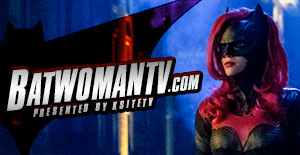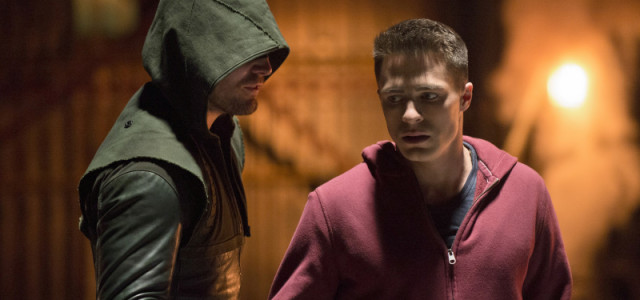
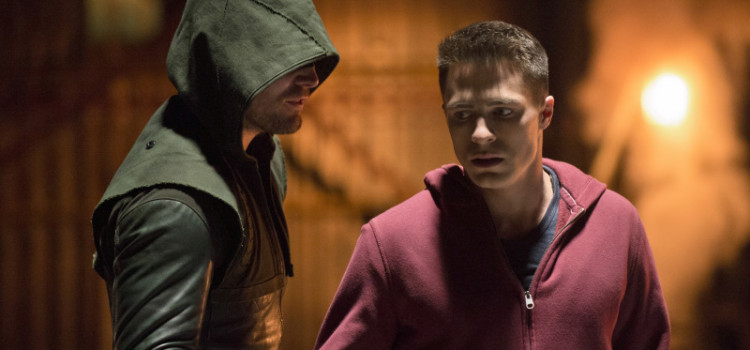
Arrow #2.12 “Tremors” Recap & Review
Recaps & Reviews February 1, 2014 Derek B. Gayle

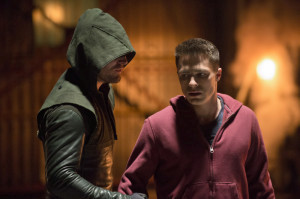 Summary: A big Roy-centric episode changes up the status quo, but exposes this season’s clutter and scattered focus.
Summary: A big Roy-centric episode changes up the status quo, but exposes this season’s clutter and scattered focus.
If you have not seen this episode yet and do not wish to be spoiled, do not continue reading!
Recap
Arrow tries to train Roy to control his rage, but Roy is intent on learning his identity and continues to lose his temper. Oliver reveals that he lost Slade because he kept the secret about Shado from him, and struggles over whether he should reveal his current secrets to Roy. Bronze Tiger is broken out of prison and hired to steal a prototype of Malcolm Merlyn’s earthquake device; Oliver and Roy confront him, but in order to get Roy to focus, Oliver reveals his identity, and reminds Roy that he needs to use Thea as his constant. Meanwhile, Laurel continues her downward spiral as she learns of her impending disbarment. After a bender, she returns to her apartment trashed, only to see Sara come to her aid. Walter convinces Moira to run for mayor against Sebastian Blood, but they first need to bury the secret about Thea’s paternity. Amanda Waller visits Bronze Tiger in prison, and offers him to join a squad she’s creating.
An in-depth recap with trivia will be posted shortly in our handy episode guide!
Review
Oliver’s a smart guy, but something Arrow has shown time and time again is that he’s capable of mistakes, and some dumb ones at that. The Mirakuru arc has given us a shakier Oliver than we’ve seen, mostly due to his fear of making the same mistakes more than once. Oliver spent most of season one trying to remain stone-faced and confident during his adventures, but his fear and uncertainty in these past few weeks has turned him a bit more neurotic and unhinged, the only advantage being that he’s at least aware of it. “Tremors” plays around with this concept, throwing out redundancy after redundancy and forcing Oliver to question how (or if) things could play out differently. Every decision for Oliver, good and bad, has allowed him to grow and learn as a hero. But would facing similar choices increase his strength and consistency—“redundancy” in the engineering sense, Malcolm Merlyn’s secret weapon—or will it, more simply, reconfirm the failures he’s already had? Malcolm’s earthquake device is back, which Oliver once failed to stop. Bronze Tiger is back, who Oliver chose to throw in jail instead of kill. Laurel is spinning out of control much like Thea and Tommy had in the past, and Oliver has to decide if intervening or staying away will help more.
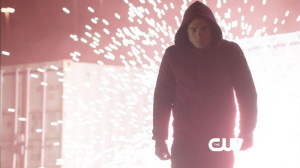 The most prominent is the Slade/Roy parallel, of course, which is spelled out a little more ham-fistedly than the others. Oliver’s constant remarks about his secret-keeping turning Slade to the darkside make the reveal of his identity to Roy a foregone conclusion, but it’s understandable why he’d be blind to that answer. After all, Oliver himself notes that “too many” people know his identity, and Roy’s high-tempered attitude and relationship with Thea are more cons and than pros. The last two positive people he brought into the world, Tommy and Barry, ended up dead and in a coma, respectively, and even if he obviously isn’t directly responsible for Barry’s state, Oliver likely carries some inexplicable guilt for it. But in spite of that apprehension, Oliver reveals his secret in a moment strikingly similar to how he revealed it to Tommy—one of extreme desperation and very little forethought. Again, redundancy is key here, and Oliver will continue to have Tommy’s death over his head as he continues down this path. There’s no love triangle to muck things up this time, luckily, but there is the problem of Thea being stuck in the middle, which could still cause problems. Nevertheless, it will be interesting to see the first official new addition to Team Arrow since Felicity (Barry was a temp, and Quentin is kind of a reserve member.) It’s a fairly drastic change to the status quo now, and a massive step towards their future together. That said, there’s still plenty of time left in the season for things to crumble just as they’ve come together.
The most prominent is the Slade/Roy parallel, of course, which is spelled out a little more ham-fistedly than the others. Oliver’s constant remarks about his secret-keeping turning Slade to the darkside make the reveal of his identity to Roy a foregone conclusion, but it’s understandable why he’d be blind to that answer. After all, Oliver himself notes that “too many” people know his identity, and Roy’s high-tempered attitude and relationship with Thea are more cons and than pros. The last two positive people he brought into the world, Tommy and Barry, ended up dead and in a coma, respectively, and even if he obviously isn’t directly responsible for Barry’s state, Oliver likely carries some inexplicable guilt for it. But in spite of that apprehension, Oliver reveals his secret in a moment strikingly similar to how he revealed it to Tommy—one of extreme desperation and very little forethought. Again, redundancy is key here, and Oliver will continue to have Tommy’s death over his head as he continues down this path. There’s no love triangle to muck things up this time, luckily, but there is the problem of Thea being stuck in the middle, which could still cause problems. Nevertheless, it will be interesting to see the first official new addition to Team Arrow since Felicity (Barry was a temp, and Quentin is kind of a reserve member.) It’s a fairly drastic change to the status quo now, and a massive step towards their future together. That said, there’s still plenty of time left in the season for things to crumble just as they’ve come together.
Until then, though, it’s nice to see Oliver feeling accomplished for once this season. Stephen Amell does some nice work in his softer material during Roy’s induction to Team Arrow, where Oliver fully admits that his decision was impulsive and could go wrong. Be that as it may, Amell plays Oliver more content than he’s been in quite a long time. Even though a threat will always exist, he won over Roy when he couldn’t do the same for Slade, and it’s a step forward in relieving him of that guilt. It helps that Colton Hayes has a natural buddy-buddy chemistry with Amell onscreen, as evidenced by their big handshake, and they could form a friendship as believable as Oliver and Slade’s.
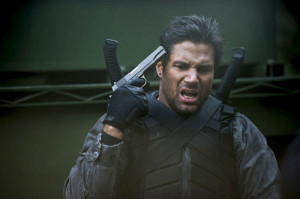 Speaking of Slade, his tragic downward slide continues with some of the more exciting island scenes this season. Even this ties a bit in with the redundancy theme, albeit more loosely, as we have Slade planning to blow up the freighter full of people with Fyers’ weapons just for his own selfish rage. Manu Bennett is consistently good as the unhinged Slade throughout all of this, but Amell steals the show with his secret fake-out at gunpoint. Team Lian Yu isn’t as fun as it was during its high point with Oliver, Slade and Shado, but this new trifecta has so much torrid history among them that the melodrama is consistently engaging. The big confrontation between Slade and Oliver is likely being saved for the finale, which is still a long way away, so the new mission to bring the fight to Ivo ought to wet the palate for the time being.
Speaking of Slade, his tragic downward slide continues with some of the more exciting island scenes this season. Even this ties a bit in with the redundancy theme, albeit more loosely, as we have Slade planning to blow up the freighter full of people with Fyers’ weapons just for his own selfish rage. Manu Bennett is consistently good as the unhinged Slade throughout all of this, but Amell steals the show with his secret fake-out at gunpoint. Team Lian Yu isn’t as fun as it was during its high point with Oliver, Slade and Shado, but this new trifecta has so much torrid history among them that the melodrama is consistently engaging. The big confrontation between Slade and Oliver is likely being saved for the finale, which is still a long way away, so the new mission to bring the fight to Ivo ought to wet the palate for the time being.
And then there’s Laurel, who this season keeps bouncing between “on the edge of redemption” and “the least likeable character ever.” This week leans towards the latter, but for good reason. Laurel’s downward spiral continues, culminating in her disbarment and subsequent binge, the latter of which provides some of the most pathetic and darkly humorous material for her thus far. Katie Cassidy isn’t terribly convincing at playing drunk Laurel, but she’s helped by some good (even if sad) lines at the bar, and she nails the drunk walk once she’s in the apartment. In any case, Laurel comes off as a big brat with a tantrum in the first half of the episode (“Can’t have a housekeeper when you don’t have a job” is probably the worst line ever spoken on this show.) Her storyline at the beginning actually functions a bit better as a character piece for Quentin, particularly with the knowledge of what happened to his other daughter. This man has gone through hell multiple times over and has still managed to keep it together now. It makes Laurel look worse when she disregards the advice of someone who’s gone through very similar circumstances, but it continually paints Quentin as a noble father, much better than in season one.
But Laurel’s refusal to embrace anything good about her situation, like her father, comes back to bite her when Joanna (good to see you again, Annie Ilonzeh!) breaks the news about her disbarment. It’s hard to feel for Laurel considering how poorly she’s responded to these challenges, even given last week, but it seems this arc is meant to expose her self-sabotage so she can fix them for the future. This hasn’t made Laurel look good in the present, but the hope is that making her the worst possible iteration of the character now will let us appreciate the stronger character she ought to grow into. The appearance of Sara in her apartment, in addition to being a nice surprise, ought to give Laurel a way to face herself more directly at some point.
And let’s not forget about that political campaign. We have to be able to strain disbelief quite a bit for a show like this, but at a certain point we can only be accept but so much. Moira running for a political campaign is laughable in her situation, and the show even uses that fact as the primary conflict for her this week. It’s not a dumb move from a story standpoint; pitting Moira against Blood ties her into the main story, provides even higher stakes, threatens Thea’s paternity and Moira’s morality, and will surely play into Slade’s plan to unravel everything about Oliver’s life. More than anything, it finally gives Susanna Thompson something to do this season other than look either kind of sad or kind of content. The showrunners are surely banking on our faith in an “ends justify the means” situation—they’re obviously aware of the ludicrousness, given how all characters point it out—but it’s still quite contrived. Some detail is thrown in to attempt to save face, like Walter throwing out some polling numbers or rationalizing the popularity of “redemption stories,” but this is no doubt one of the oddest developments in the show’s history.
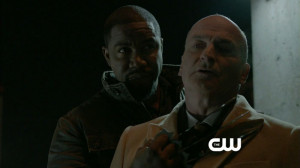 The episode ends with a fun little comic book anvil drop by way of starting the Suicide Squad. It’s surprising, considering how Cynthia Addai-Robinson’s introduction as Amanda Waller was mostly underplayed and forgotten, given that there are already so many dangling threads and villains hanging out there this season. That’s a little nervewracking, considering Smallville also had Amanda Waller announce the formation of the squad in the middle of a rather cluttered season, and its version of Waller and the Squad petered out without doing much. Arrow has been more competent with handling its long-term storylines, and both of Waller’s appearances suggest that she was the red-shoed woman who employed Fyers, which gives her a meaty tie to a couple of major storylines. But as it stands, this seems more likely to be a tidbit that will be delivered in pieces and come together in a future season rather than this one. Though, with this show’s penchant for superspeed plot-burning, it might come together in the next couple of episodes.
The episode ends with a fun little comic book anvil drop by way of starting the Suicide Squad. It’s surprising, considering how Cynthia Addai-Robinson’s introduction as Amanda Waller was mostly underplayed and forgotten, given that there are already so many dangling threads and villains hanging out there this season. That’s a little nervewracking, considering Smallville also had Amanda Waller announce the formation of the squad in the middle of a rather cluttered season, and its version of Waller and the Squad petered out without doing much. Arrow has been more competent with handling its long-term storylines, and both of Waller’s appearances suggest that she was the red-shoed woman who employed Fyers, which gives her a meaty tie to a couple of major storylines. But as it stands, this seems more likely to be a tidbit that will be delivered in pieces and come together in a future season rather than this one. Though, with this show’s penchant for superspeed plot-burning, it might come together in the next couple of episodes.
Like the previous two episodes after the hiatus, “Tremors” is a bit underwhelming compared to the season’s first half, but still delivers enough on the excitement and adrenaline that it’s entertaining. Roy has been a not-so-secret weapon on the show lately, so bringing him into the team can only yield further entertaining results, too. The biggest problem is the continued clutter of storylines; as soon as some intersect, more start dangling in their places (the political campaign and Suicide Squad this week.) No episode this season has been particularly bad—in fact, few have been any less than great, which is a feat—but the season as a whole is revealing itself to be confusingly unfocused. The first half excelled with the thought that many plots would eventually coalesce into something huge, and while there were signs of them at least crossing over more last week, “Tremors” feels even more splintered than ever. As much as we harped on the List as a plot device in the first season, it kept things tight as it escalated to the Undertaking. Season two has a more “throw it all in the pot” approach, as evidenced by the reveals in “Tremors”, and it remains to be seen if the end will justify the means.
Odds & Ends
- Michael Jai White is just fine as Bronze Tiger, but the character he’s playing is the blandest of the bland. He works in the context of the episode, though, mostly as a way to throw in comic book villainy without having too much character work get in the way. Also, the gruesome way his weapons are delivered at the beginning of the episode? Totally brutal.
- Maybe I missed it, but was there a reason the Arrow was holding a samurai sword during his training with Roy in the opening? Roy was only doing his water smacking, after all. (Nice callback to Shado’s teachings, by the way.)
- So, Malcolm Merlyn’s house is completely untouched almost a year after he’s declared dead and responsible for destroying half the city? There’s a picture of Tommy, all his cars are still there, none of the furniture is covered, and investigators never searched the place for further evidence, like…you know…a working prototype of the device? I know the guy had money and could pull some strings, but there’s only so much that can be rationalized here.
- It’s always nice to see Nicholas Lea in a genre show, and casting him here pretty much ensures that his character is going to turn out to be a mole for Slade.
- We’ve harped on Laurel as a character since day one, and there’s still miles to go for her. But we don’t say enough how great of a character Thea has grown into. Willa Holland hasn’t had too much to do this season, but that a similar problem character like Thea has grown into such a likeable character in a short amount of time gives hope that Laurel can eventually be the character we want her to be, too.
- Felicity calls Team Arrow…well…Team Arrow, proving that she’s one of us.
- The banter between Oliver and Felicity about hacking into a prison system network, and Oliver’s “pride” response, is both funny and sweet.
- “Bronze Tiger…which is a terrible name because tigers are not bronze.”
- “You both scoff when I saw we should invest in an X-Ray machine down here.”
A SECOND OPINION
by Matt Tucker
There is no chance, no way in hell that Moira Queen would ever be considered a viable candidate for any sort of public office in Starling City. There are some fantastical things that can be accepted, a high degree of disbelief to be suspended in a show like this. But given a society that would never elect a man who sent illicit pictures of his private parts over the internet, it’s positively ludicrous to get us to believe that someone who was involved, in any fashion, in something as devastating as the Undertaking would garner some kind of political clout and public following. Yes, there were extenuating circumstances, and we, the audience, are fully briefed on all the intricacies of what occurred. To the public of Starling City, sure, she was acquited in a court of law, though the acquital seemed to come out of nowhere (which it did). These were people that were rabid for her blood just a few months ago. For as smart of people as Moira and Walter Steele are, this seems like a gross evacuation of character to make this work. For Nicholas Lea’s character, it’s hard not to think he’s part of Slade Wilson’s plans. It’s just too much of a stretch to think the public would give Moira enough leniency and leeway to even get a campaign off the ground.
Incredulity aside, the obvious shocker here was Oliver’s reveal to Roy. We had to know it was coming at some point; it was just a matter of when. Thankfully, they didn’t stretch this out, as it would’ve been tough for Roy to really get on board with Oliver’s training without the open exchange of secrets. It was a particularly masterful stroke to have Oliver use the reveal as the way to get roid-rage Roy to see some sense. Even more so that it was a move out of desperation, a call to action readily answered. Always nice to see a proactive hero, and even though this was a reactive moment, it’s a decisive move on his part. One that will likely pay off well in the end.
Laurel continued her downward spiral and it’s terrific that they didn’t let her off the hook. They easily could’ve used the mulligan of having Joanna get her a job and provide some kind of safety net while she tries to put her life back together. Thankfully, they didn’t, and it made Oliver calling in Sara to help her sister that much more impactful. It’s a rather massive development along the path to the Black Canary.
What might get lost along the way is the rather innocuous confirmation of DC “baddie” Amanda Waller as the woman behind Fyers’ operation on Lian Yu. (Having the flashbacks focus on Slade attempting to use Fyers’ missile launcher to take down the Amazo was a sly narrative device to strengthen and solidify that connection.) Though her entrance by first focusing on her red heels as she walked into the prison to recruit Ben Turner was fairly obvious, it wasn’t as grandly spelled out for those who aren’t being a bit more eagle-eyed in their viewing. Yes, the tactic was previously employed during Waller’s first appearance on the series earlier in the season in “Keep Your Enemies Closer,” but it wasn’t nearly as effective as it was here. While we’re aware of her connections to the clandestine A.R.G.U.S. group, seemingly solidifying this connection is a superb choice that gives Waller devious credibility and ruthlessness. The excitement of the introduction of the nascent Suicide Squad might overshadow this non-verbal confirmation, but it’s yet another example of the superb plotting and absolutely commitment to this world on the part of the showrunners.
There is consequence to everything at play here, and while sometimes these kinds of connections can make for a world seeming smaller — prime example being all of the rather inane connections between the original and prequel trilogies of the Star Wars franchise that made that vast universe suddenly feel like a fence fight between neighbors — here it intensifies the situation Oliver Queen stumbled into six years ago and of which he has never really gotten free. The Mirakuru and Slade Wilson in the present; and Sara, Merlyn, and the League of Assassins are but further layers connecting one large, intricate story that makes for a scarier world at large. One only hopes that those watching the show can recognize and appreciate the talent and effort on display here. Not everything always works, and as for specific scripts, sometimes the dialogue can cause some wincing, including the numerous mentions of Oliver not letting what happened to Slade happen to Roy in this very episode. Yet, that’s the nature of serialized storytelling.
With Arrow and an episode like this, it’s nice to feel paid off for the investment rather than just strung along because we’re supposed to like something.
Derek B. Gayle
Derek B. Gayle is a Virginia native with a BS in English, Journalism and Film from Randolph-Macon College. In addition to being an avid Power Rangers and genre TV fanatic, he also currently co-produces, writes and performs in local theatre, and critically reviews old kids' cartoons. You can check out his portfolio here.
Arrow Reunion Picket Set For August 11
News Aug 4, 2023
Stephen Amell Is Returning To The Arrowverse!
News Jan 8, 2023
Happy Arrowversary!
News Oct 10, 2022
Mia Queen Returns For The CW’s “Armageddon”
News Aug 25, 2021
Arrow Season 8 Blu-ray & DVD Coming April 28
News Feb 5, 2020
End of an Arrow: Thoughts on the Series & Finale
News Jan 28, 2020

